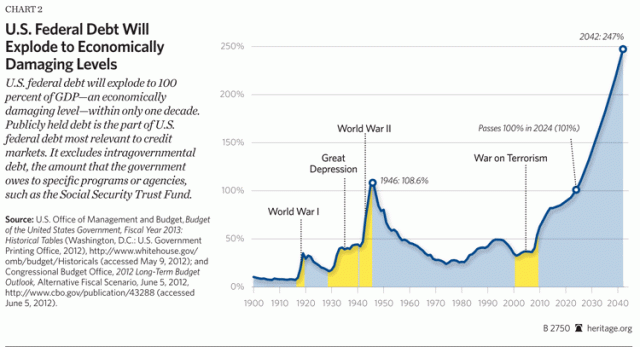Chart of the Week: U.S. Federal Debt and the Fiscal Cliff
Michael Sandoval /
In just a little over a decade, the U.S. federal debtwill exceed 100 percent of gross domestic product (GDP), an “economically damaging” level, according to analysis from The Heritage Foundation based on numbers provided by the U.S. Office of Management and Budget and the Congressional Budget Office.
To the numbers:
Fiscal year (FY) 2012 closed on September 30 with the Congressional Budget Office (CBO) estimating spending of $3.5 trillion and a deficit of $1.1 trillion. Debt held by the public was $11.3 trillion (73 percent of GDP). According to the CBO, debt will explode to 199 percent of GDP by 2037, driven by growth in spending that will reach 36 percent of GDP.
The Heritage Foundation’s Saving the American Dream plan would avert the debt crisis by focusing on reducing and restructuring the spending driving the rapidly increasing need for additional debt over the long term. As the Heritage Foundation’s Alison Acosta Fraser, William Beach, and Stuart Butler explain:
Unless Congress and the President act promptly and wisely, sequestration under the Budget Control Act (BCA) will undermine military readiness, and the nearly $500 billion tax increase starting on January 1, 2013, will greatly harm an already weak economy. However, this fiscal cliff can be avoided. The key to avoiding this and future fiscal calamities is reform of the mandatory spending programs, from welfare to Social Security, that currently drive federal deficits. The Heritage Foundation’s Saving the American Dream plan would rein in spending immediately, restructure the major entitlement programs to bring entitlement spending under control over the long term, and strengthen the core foundations of these programs.
Driving the spending are the fastest growing programs–Social Security, Medicare, and Medicaid–that cause the “large and unsustainable deficits” now and into the future, as all three programs proceed on autopilot.

